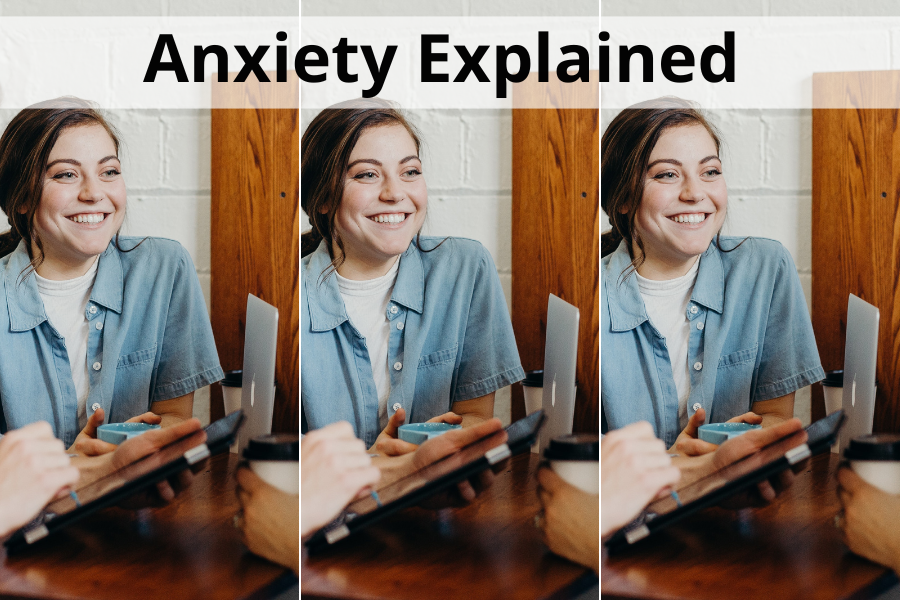This post is about anxiety explained to someone who doesn’t have it.
This post may contain affiliate links, which means I’ll receive a commission if you purchase through my link at no extra cost. Please read the full disclosure here.

Anxiety is when you feel worried or scared about something, and it can be hard to explain it to your friends and family who haven’t felt that way before. But don’t worry! You can help them understand by talking to them about how you feel.
When I had pressure and stress, I discussed what behaviour and circumstances triggered my anxiety. I explained it to the people I loved and those I spent the most time with.
At first, it wasn’t easy explaining my anxiety to someone who didn’t have it; however, by doing it calmly and authentically, others wanted to help and learn more!
In this post, you will learn about anxiety explained to someone who doesn’t have it.
Anxiety explained to someone who doesn’t have it.
1. Explain what anxiety feels like for you.
Whether it’s a sense of worry or fear that doesn’t go away or physical symptoms like a racing heartbeat or sweaty palms, let your loved ones know what triggers your anxiety and how it affects your daily life.
Explain that a specific topic of discussion or certain activities will make you feel worse. Help them understand what activities to do together to make you feel better. Knowledge is power; if your loved ones know how to help you, they are more likely to want to do it.
2. Communicate openly with your loved ones.

Being open and honest with your loved ones about your feelings is really important. If you need support or someone to talk to, don’t be afraid to ask those around you.
We often worry about what others will think of us, and this is no truer than when you have a mental health condition. We might ask ourselves, will they still like me if I tell them? Will they even be able to help? Maybe I should keep this a secret?
Renee Firth
Try not to talk yourself out of being open with your friends and family about anxiety. You might be surprised to learn they may also be experiencing the same thing.
Related Post: Shopping Guide: Top Stress Relief Products Available on Amazon
3. Take time for self-care.
It’s okay to take time for yourself to practice self-care and manage your anxiety.
By taking time for self-care, you are helping yourself manage your anxiety and showing your loved ones that you’re taking an active role in your mental health.
- Self-care shows loved ones that anxiety is a condition that needs care and attention, not something easily overcome or brushed off.
- Prioritising self-care can help others understand how they can support you when you feel anxious.
- You can tell them about specific things you do to feel better, such as taking a bath or going for a walk. It can give them ideas on how they can help you.
- When discussing your self-care, you might inspire others to care for themselves too.
If you are looking for self-care ideas, here are the best ones that worked for me and what I continue to do throughout my stressful moments to help me stay in control and focused on my well-being – 11 Self-Care Ideas For Boosting Your Mental Health
4. Use available resources.

Anxiety can be tricky, but you don’t have to face it alone. To help your friends and family understand what you’re going through, use resources to learn more about it. You can learn more about anxiety here, watch videos, or talk to a therapist.
Joining an online support group, Facebook group, or online forum can be a great help. Here is why:
- Learning more about your anxiety can help you explain it better to others.
- In a support group, you can interact with others with similar experiences and ask for advice on explaining your anxiety to people who don’t understand it.
- Sharing your experiences in a support group might also help other group members.
When you understand your anxiety better, you can explain your feelings to your friends, co-workers and family.
5. Seek professional help to help you explain your anxiety.
If your anxiety impacts your daily life or you struggle to manage it alone, don’t hesitate to seek professional help.
When I met regularly with a psychologist, they helped me with my struggles and gave me creative ways to explain my anxiety to others. It made me feel confident discussing with my family and friends what I was going through and how they could help.
Speaking to a mental health professional can make you feel more confident talking about your stress and not hesitating to discuss it when others want to ask about it.
This post was about anxiety explained to someone who doesn’t have it.

